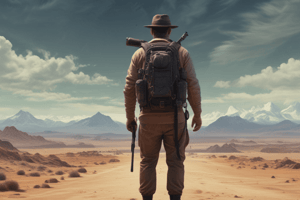Podcast
Questions and Answers
Which shot type is primarily used to emphasize a character’s emotions?
Which shot type is primarily used to emphasize a character’s emotions?
- Long Shot
- Close-Up (correct)
- Wide Shot
- Medium Shot
What effect does high-angle camera placement typically have on audience perception?
What effect does high-angle camera placement typically have on audience perception?
- Generates sympathy for a character
- Enhances character strength
- Increases tension and suspense
- Diminishes character significance (correct)
Which type of editing cut is primarily used to create a sudden impact or disorientation?
Which type of editing cut is primarily used to create a sudden impact or disorientation?
- Jump Cut (correct)
- Fade Cut
- Cutaway
- Match Cut
How does diegetic sound differ from non-diegetic sound?
How does diegetic sound differ from non-diegetic sound?
Which lighting technique is used to create suspense and a dramatic mood?
Which lighting technique is used to create suspense and a dramatic mood?
What role does music typically play in film narrative?
What role does music typically play in film narrative?
What is the primary purpose of using a tracking shot in cinematography?
What is the primary purpose of using a tracking shot in cinematography?
What is the impact of pacing on a film scene's emotional moments?
What is the impact of pacing on a film scene's emotional moments?
How does non-diegetic sound impact the mood in a film?
How does non-diegetic sound impact the mood in a film?
What role does silence play in a film scene?
What role does silence play in a film scene?
What effect does lighting have on the mood or atmosphere of a scene?
What effect does lighting have on the mood or atmosphere of a scene?
How do costume choices contribute to character development?
How do costume choices contribute to character development?
What is one function of mise-en-scène in film analysis?
What is one function of mise-en-scène in film analysis?
What can changes in music tempo or intensity indicate in a film?
What can changes in music tempo or intensity indicate in a film?
Which of the following best describes interpretative analysis in film?
Which of the following best describes interpretative analysis in film?
What does low-key lighting typically create in a scene?
What does low-key lighting typically create in a scene?
What effect does a low angle shot create in a film scene?
What effect does a low angle shot create in a film scene?
How does a jump cut impact a scene?
How does a jump cut impact a scene?
What is the primary purpose of a tracking shot?
What is the primary purpose of a tracking shot?
What role does non-diegetic sound serve in a film?
What role does non-diegetic sound serve in a film?
Which editing choice is characterized by a series of short shots to show time passing?
Which editing choice is characterized by a series of short shots to show time passing?
How does fast pacing in editing affect a film scene?
How does fast pacing in editing affect a film scene?
What implication does an eye-level camera angle have in filming?
What implication does an eye-level camera angle have in filming?
What is a primary characteristic of a match cut in editing?
What is a primary characteristic of a match cut in editing?
Flashcards
Close-up shot
Close-up shot
A shot that focuses on a specific detail, often a person's face, emphasizing emotion or importance.
Medium shot
Medium shot
A shot that shows a character's body from the waist up, commonly used for dialogue scenes.
Wide/Long shot
Wide/Long shot
A shot that shows the entire setting and characters, providing context and environment.
Camera angle (high)
Camera angle (high)
Signup and view all the flashcards
Camera angle (low)
Camera angle (low)
Signup and view all the flashcards
Diegetic sound
Diegetic sound
Signup and view all the flashcards
Non-Diegetic sound
Non-Diegetic sound
Signup and view all the flashcards
Shot type impact
Shot type impact
Signup and view all the flashcards
Tracking Shot
Tracking Shot
Signup and view all the flashcards
Jump Cut
Jump Cut
Signup and view all the flashcards
Why use a Match Cut?
Why use a Match Cut?
Signup and view all the flashcards
What does fast pacing suggest?
What does fast pacing suggest?
Signup and view all the flashcards
Slow pacing
Slow pacing
Signup and view all the flashcards
What does a montage do?
What does a montage do?
Signup and view all the flashcards
Setting's Role
Setting's Role
Signup and view all the flashcards
Props & Meaning
Props & Meaning
Signup and view all the flashcards
Costume Clues
Costume Clues
Signup and view all the flashcards
Makeup's Message
Makeup's Message
Signup and view all the flashcards
High-Key Lighting
High-Key Lighting
Signup and view all the flashcards
Low-Key Lighting
Low-Key Lighting
Signup and view all the flashcards
Color Temperature
Color Temperature
Signup and view all the flashcards
Descriptive Analysis
Descriptive Analysis
Signup and view all the flashcards
Study Notes
Key Micro Elements in Film Analysis
- Cinematography
- Understand shot types (e.g., close-up, medium, wide) and their impact on meaning.
- Camera angles (e.g., high, low) influence audience perception of characters.
- Camera movement (e.g., tracking, panning) affects mood and narrative flow.
- Editing
- Types of cuts (e.g., jump cuts, match cuts) and their narrative impact.
- Pacing influences emotional moments (fast for tension, slow for emotional moments).
- Sound effects enhance realism.
- Music and score convey emotion or foreshadow events.
- Mise-en-scène (arrangement) includes props, costumes, setting, and color.
- Lighting
- Lighting types (e.g., high-key, low-key) impact mood and tone.
- Analytical Techniques
- Textual Analysis: Describe camera angles, lighting, and editing in detail.
- Meaning and Impact: Analyze how elements support or challenge narrative and affect viewer emotion.
- Practice Questions
- Analyze at least two micro elements in a film scene.
- Describe how sound and cinematography convey character.
Cinematography (Continued)
- Shot Types
- Close-up: Emphasizes emotion or detail.
- Medium shot: Shows more of the body and setting, focusing on dialogue.
- Wide/Long shot: Establishes context and environment.
- Camera Angles
- High angle: Implies vulnerability.
- Low angle: Implies power.
- Eye-level: Neutral perspective.
- Camera Movement
- Tracking shot: Follows subject for continuity.
- Pan/Tilt: Reveals more of the scene or follows action.
- Zoom: Focuses attention without moving the camera position.
Editing (Continued)
- Types of cuts
- Straight Cut: Maintains continuity.
- Jump Cut: Creates disorientation or emphasizes urgency.
- Match Cut: Connects two scenes visually or conceptually.
Sound
- Diegetic Sound: Sound within the film world (dialogue, footsteps).
- Non-Diegetic Sound: Sound outside the film world (score, music, narration).
- Music and Score: Sets tone, mood, and creates suspense.
Mise-en-Scène
- Setting and Props: Reflects mood and enhances themes.
- Costume and Makeup: Communicate character, period, and social status.
Key Analytical Techniques
- Descriptive Analysis: Identify and describe elements in the scene.
- Interpretative Analysis: Explain the significance of elements and how they work together.
Exam practice tips
- Structured Responses: Describe, analyze impact on audience, and finish with overall impact.
- Use Examples: Support points with specific examples from the scene.
Studying That Suits You
Use AI to generate personalized quizzes and flashcards to suit your learning preferences.




